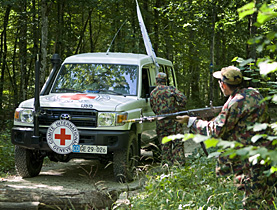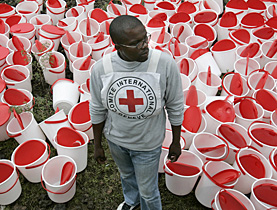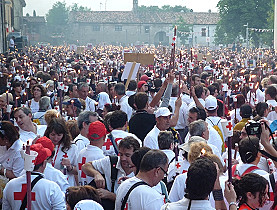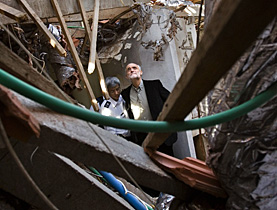On mission with the ICRC in Geneva

How do you train someone to negotiate a military checkpoint, assist thousands of conflict victims, teach the rules of war to rebels and handle the media?
To find out more swissinfo.ch followed 18 new delegates from the International Committee of the Red Cross (ICRC), who were learning the ropes in Geneva before heading out to the field.
It’s Tuesday morning. After a week of theory at the Ecogia training centre just outside Geneva, four teams of new delegates were preparing to put into practice what they had learned during a day of intensive simulation exercises.
“Today’s their day of truth,” explained my guide, ICRC delegate Marçal Izard. “They are very scared of making a mistake, so we try not to add too much pressure.”
Posing as a local TV journalist, Izard’s job was to interview the young delegates as they rushed around the lush green countryside in their 4x4s visiting a camp of displaced people and a bombed hospital, and trying to talk their way through a military checkpoint.
Makeshift camp
“This is the weakest part of the scenario,” explained Izard, pointing to four displaced people – or experienced ICRC staff – squatting around a small wood fire in the Grand Champs forest not far from the centre.
According to the exercise, the displaced were among thousands of people who had fled the nearby village of Collex, which had been bombed during fighting between the Alpesian Defence Forces and Front de Libération des Sequanes (FLS) rebels hours earlier.
A 4×4 pulled up; the first group of delegates approached the camp sheepishly and introduced themselves. As they started gathering information about food, water and medical needs, Izard interviewed Jerôme, the group’s media spokesman, who coolly batted back the tricky questions.
“And what can you tell us about the 14 bodies found at the side of the road, allegedly killed by the FLS terrorists?” asked Izard.
“We have no access to that area. We need to assess the situation before we can say anything,” replied Jerôme.
Medical professionals
“In reality you are often overwhelmed by the needs. People think you can do miracles. In Colombia I was harassed day and night. You soon realise your limitations,” explained Izard, as we drove to nearby Richelieu hospital.
At the devastated medical facility, delegates from another group talked to a doctor who had been left on his own to look after 100 wounded villagers. They then prepared to evacuate the most seriously injured – well, one – to nearby Versoix Hospital.
“I had the impression that I was dealing with real professionals. They took a long list of the needs and reassured me that they would actually come back, which is not always the case,” said pretend doctor Rene Manin.
“The only thing is I’m also a victim of the conflict; I have no news of my family, I’m working alone and am exhausted. I could have done with some human contact and empathy myself.”
Military grilling
Just down the road, Raoul Bittel, commander of the Alpesian Defence Forces, and four soldiers, kitted out with real camouflage uniforms and guns, were manning a checkpoint looking out for FLS “terrorists”.
During the day each delegate group that tried to pass the checkpoint was grilled by the soldiers and tested on whether they could keep cool, negotiate the release of their kidnapped field officer and treat an injured person. The military trainers don’t make life easy, though.
“They accepted to take me to the hospital, which was very good, but they should have checked whether I had a gun in my pocket,” said Isabelle Egger, who was playing a wounded soldier at the checkpoint.
Bittel praised the last group for being calm and using good arguments to secure the release of their colleague. Unlike the previous one, which was “pushy and undisciplined” and could have got itself shot, he said.
“They made mistakes – but everyone makes mistakes,” said the commander.
Mission impossible?
Back at the training centre the delegates wound down over lunch.
“It was stressful for me, as I played team leader and had lots to think about,” said Johnny Nehme from France.
“It’s not easy,” said Daniel Glintz, a trainer of new delegates. “They need to regurgitate theoretical knowledge and be careful about teamwork, personal appearance and managing their emotions.”
But it is not mission impossible to train a new delegate in only three weeks, he added.
Over the past 20 years the teaching has adapted considerably.
The ICRC has moved from “gathering 20 new people around a table with lots of wine and cigarettes” to listening to old-timers recount their humanitarian adventures to a more learner-centred approach, said Glintz.
New delegates are given the “minimum equipment” for a standard journey. And under recent changes, they now get a refresher course after six months where they can discuss problems and receive additional training.
But they still face many unknown challenges on their first mission.
“International humanitarian law is the ICRC’s weapon,” said Izard. “But I found that the first time I arrived in the field I wasn’t briefed enough and I didn’t have time to study. Sometimes I was facing military commanders who knew more than me.”
Right balance
Demand for new delegates fluctuates slightly – on average 200 newcomers a year – but their profile has not changed much over time, said Glintz.
“The ICRC is an interesting job and one that makes sense. Money is not high on the list. New delegates are curious about other human beings, love meeting people and a challenge and want to find out more about themselves,” he noted. “And there are people who don’t like injustices and still have a rebellious attitude.”
Technological comforts like the internet and SMS text messages now allow delegates to stay in contact with their families and friends, but this hasn’t changed them, said Glintz.
The drop-out rate after the first year remains low compared with other agencies – five to ten per cent – and once inside the organisation people tend to commit for several years to an intense, highly demanding career.
But if you want to stay with the ICRC you have to find the right balance, said Glintz.
“Some people stay as they have no option or are addicted to the adrenaline of missions, going from one to another without building a home or family,” he said. “And the organisation’s strong identity means that turning the page after an ICRC career is not easy.”
Simon Bradley in Ecogia, swissinfo.ch
The ICRC is a private humanitarian agency governed by a committee of between 15 and 25 exclusively Swiss members.
Its budget last year was SFr1.1 billion ($949 million) – the highest ever.
Switzerland is the third-largest financial contributor, after the United States and Britain. In 2008, Bern gave the body SFr101.05 million, which included SFr70 million for its headquarters and SFr30.5 million for aid programmes. Switzerland is set to contribute a total of SFr105 million for 2009.
The ICRC employs about 11,800 people including 9,500 national staff and more than 1,300 expatriate delegates.
Until the 1990s, only Swiss citizens were allowed to serve as ICRC delegates abroad.
Some 90 per cent of the ICRC’s funding comes from governments but the organization is independent of any government.
The ICRC says it works in 80 countries and assists roughly 15 million people each year.
The ICRC is the custodian of the Geneva Conventions.
Some of body’s biggest operations include Sudan, Somalia, Iraq, Afghanistan, Sri Lanka and Chad.
New delegate starting salary SFr70,000-86,000 per year, according to previous experience and qualifications.
Delegate basic conditions: candidates should be available to leave for 24 months without their family and must be ready to deploy to any country; for delegates and administrative staff the age limit is 25-35; fluent in English and French; as a rule, candidates must have completed university or similar education and have at least two years professional experience after obtaining their degree; six weeks’ holiday and additional compensation leave of ten days every three months on missions with difficult living conditions.
Average length of stay with ICRC: 3 – 5 years.

In compliance with the JTI standards
More: SWI swissinfo.ch certified by the Journalism Trust Initiative














You can find an overview of ongoing debates with our journalists here . Please join us!
If you want to start a conversation about a topic raised in this article or want to report factual errors, email us at english@swissinfo.ch.